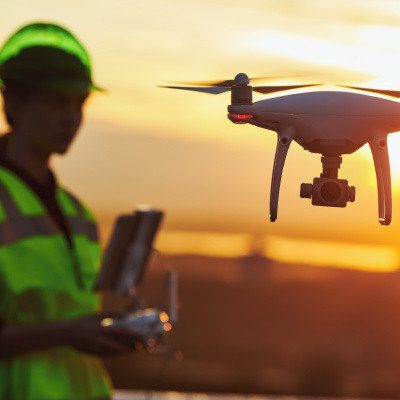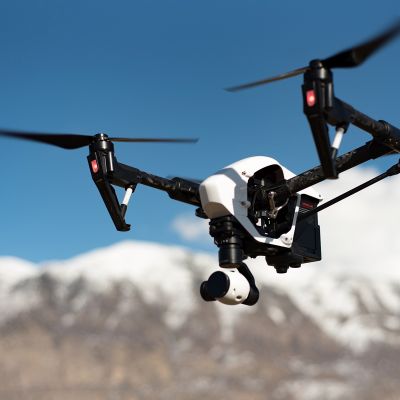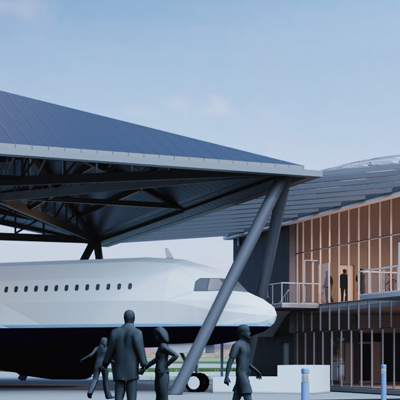From building and flying electric aircraft to protecting the communications of drones, researchers at Cranfield University are taking part in nine projects recently announced as winners of UK Research and Innovation’s (UKRI) Future Flight Challenge (FFC).
Cranfield is working with a range of industry partners and organisations – including airports, start-ups, regional and local authorities – on the projects as part of the challenge which aims to revolutionise aviation and drone usage to transform the way people, goods and services fly.
The projects – which have a total award value of over £8.5 million – cover the use of drones capable of delivering COVID-19 medical supplies to remote areas, to technology to enable remote inspections of infrastructure and construction sites. They will also tackle key infrastructure and air traffic management challenges to ensure the UK maintains its exceptional air safety record and delivers practical and integrated solutions.
Professor Helen Atkinson CBE FREng, Pro-Vice-Chancellor, Aerospace, Transport Systems and Manufacturing at Cranfield University said: “Our responses to the Future Flight Challenge are harnessing the potential of electric and autonomous flight technology to transform air transport services in a safe and environmentally-friendly way.
“We’re delighted to be involved in such a wide range of successful bids, which is testament to our close relations with industry and the breadth of research knowledge and expertise at Cranfield. Our global research airport provides a unique environment to develop and test the airspace management technologies, supporting ground infrastructure and aircraft of the future.”
In announcing the projects to be funded as part of the FFC, Minister for Business, Paul Scully, said: “We’re investing in ambitious projects, like the development of drones delivering medical supplies, to ensure the aviation industry is championing the latest cutting-edge technology.
“Pioneering research supported by government funding will help the UK build back greener from the pandemic, remain at the forefront of aerospace research and development, and demonstrate global leadership in the next aviation revolution. I look forward to seeing such proposals take flight.”
The FFC projects Cranfield is involved with include:
- Aviation Innovation in the South West – development of an operational environment in a representative urban region;
- Airspace of the Future (AoF);
- Project Rise;
- Unmanned Aircraft Systems Authentication System (UASAS);
- Future Urban Synthetic Environments (FUSE);
- Enabling Infrastructure for Medical Drone Deliveries (INMED);
- Enabling Aircraft Electrification (EnabEl);
- Project Napkin.
Many of the projects involve researchers from Cranfield’s Centre for Autonomous and Cyberphysical Systems and the new £65 million Digital Aviation Research and Technology Centre (DARTeC), due to open at the University this year.
Academics are already working with industry on projects to reimagine what airports and airlines look like post-COVID-19 and drive forward innovations in digital airspace and airport infrastructure that will help the UK reach its target of net zero carbon emissions.
In September last year, Cranfield supported ZeroAvia in achieving the world’s first hydrogen fuel cell powered flight of a commercial-grade aircraft, with the milestone taking place at the company’s research and development facility at Cranfield Airport.
The FFC supports the development of new technologies in the UK, including freight-carrying drones, urban air vehicles, and hybrid-electric regional aircraft. It is funded by £125 million from the Industrial Strategy Challenge Fund, matched by up to £175 million from industry.
Notes for editors
Cranfield University project leads are:
- Aviation Innovation in the South West – Professor Antonios Tsourdos / Dr Saba Al-Rubaye / Dr Dimitrios Panagiotakopoulos;
- Airspace of the Future (AoF) – Dr Dimitrios Panagiotakopoulos / Professor Antonios Tsourdos / Dr Ivan Petrunin;
- Project Rise – Dr Saba Al-Rubaye / Professor Antonios Tsourdos;
- Unmanned Aircraft Systems Authentication System (UASAS) – Dr Saba Al-Rubaye / Professor Antonios Tsourdos;
- Future Urban Synthetic Environments (FUSE) – Dr Dimitrios Panagiotakopoulos / Professor Antonios Tsourdos;
- Enabling Infrastructure for Medical Drone Deliveries (INMED) – Dr Ivan Petrunin;
- Enabling Aircraft Electrification (EnabEl) – Dr Guy Gratton;
- Project Napkin – Professor Graham Braithwaite / Jenny Kavanagh, Chief Strategy Officer, Cranfield Aerospace Solutions Ltd.



